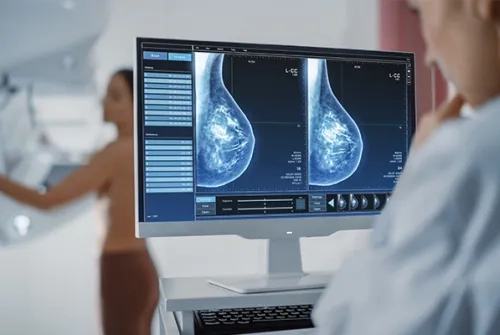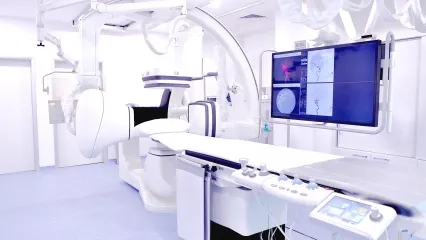Alo Yeditepe
Alo Yeditepe
Skipping Mammography Screening Can Be a Life-Threatening Risk!
The effectiveness of mammography, which remains the gold standard for breast cancer screening and early diagnosis, was once again demonstrated by a published study. In this study on women diagnosed with breast cancer, it was shown that skipping mammography screening also has a significant impact on breast cancer mortality. Yeditepe University Kozyatağı Hospital Radiology Specialist Assoc. Prof. Dr. Filiz Çelebi evaluated the study carried out on approximately 550 thousand women.
Reminding that the diagnosis of the disease at an early stage is of great importance in achieving successful results in breast cancer treatment, Radiology Specialist Assoc. Prof. Dr. Filiz Çelebi said that performing mammography regularly and without skipping may be the key to reducing the loss of life in breast cancer.
Regarding the study, which revealed that the loss of life was higher in women who missed only one mammogram before being diagnosed with cancer Yeditepe University Hospitals Radiology Specialist Assoc. Prof. Dr. Filiz Çelebi told: “In the study, patients were divided into four groups: those who had their last mammogram before diagnosis, those who had the penultimate one, those who had their last two mammograms regularly, and those who had never had it. According to this study, which was carried out on approximately 550 thousand women between 1992 and 2016; Breast cancer mortality (life-loss rates) is lower in women who have had both screening mammograms before being diagnosed with breast cancer. It is seen in the same group that the rate of death from breast cancer decreased by 50 percent in 10 years.
Mortality Increased in Those Who Had Their Mammograms Irregularly!
On the effect of regular mammography on mortality Assoc. Prof. Dr. Filiz Çelebi gave the following information:
“Mammography is a very effective imaging method for detecting microcalcifications, which are signs of very early-stage cancers. Therefore, the regular application ensures earlier diagnosis and early treatment. This is also important in terms of both the mortality of the patient and the type of surgery. The patient can regain her health with minimal surgery. But the key word here is 'regular mammography'. An approach such as "I have had it taken now, I will have it taken next in 5 years." naturally creates risks. Risk factors were investigated between those who occasionally skip mammography and those who always have it, in this study. The difference between the loss of life of those who have regular mammograms and those who have never had mammograms or those who have irregular mammograms has been clearly demonstrated”
Mammography Is Also Valuable in Preventing Loss of Life…
Underlining that the most important factor in reaching this result is the detection of breast cancer at an early stage, Assoc. Prof. Dr. Filiz Çelebi said, “These statistics reveal the importance of regular mammography. The death toll from breast cancer drops significantly for those who have had their last two mammograms. This is a very important result.”
Reminding that there are different strategies in breast cancer mammography screening among the countries, Assoc. Prof. Dr. Filiz Çelebi continued her words as follows:
“For example, mammography starts after the age of 50 and is done every 2 years in some countries such as the UK and the USA. However, since we have a younger population in our country, mammography screenings start at the age of 40. If the person does not have an individual risk, we recommend that they have it done once a year after the age of 40.”
If There Is a Diagnosis of Breast Cancer Under the Age of 40 In The Family…
It is very important to have a regular mammogram once a year from the age of 40. However, stating that if someone in a person's family, especially first-degree relatives, has been diagnosed with breast cancer under the age of 40, they should start screening earlier, Assoc. Prof. Dr. Filiz Çelebi said; “For example, a person whose mother was diagnosed with breast cancer before the age of 40, should start screening at the age of 30, 10 years before the age at which his mother was diagnosed. Since these people constitute a special group, we also use breast MRI in their follow-up. Preferably, I recommend doing a breast MRI 6 months after mammography. But both can be done at the same time.”
There Is Still Misinformation About Mammography!
Stating that people have become much more conscious of the efforts aimed at increasing social awareness in our country in recent years, Yeditepe University Hospitals Radiology Specialist Assoc. Prof. Dr. Filiz Çelebi explained that a group of women also had false information about mammography, which they thought was correct, and concluded by saying: “It is thought that the radiation dose to be taken by having a mammogram can also cause cancer. Actually, that is not the case. Because technology has advanced quite a bit in this sense. It has been proven by many scientific data that the radiation dose received by mammography, especially including mammography systems containing tomosynthesis, is acceptable in the diagnosis and does not cause breast cancer itself. There is also a misconception that the procedure is painful. After all, it's a diagnostic method and only takes a few minutes. Pain is a relative concept that can change according to the pain threshold of the person. However, in the end, it is possible to say certainly that no pain requires avoidance and is feared. Therefore, I recommend that all women after the age of 40 have it done once a year.”
Press Coverage: cumhuriyet | gunes | haberler | cnnturk | yeniakit | gazetevatan | turkuazgazetesi | t24
This content was prepared by Yeditepe University Hospitals Medical Editorial Board.
Alo Yeditepe


